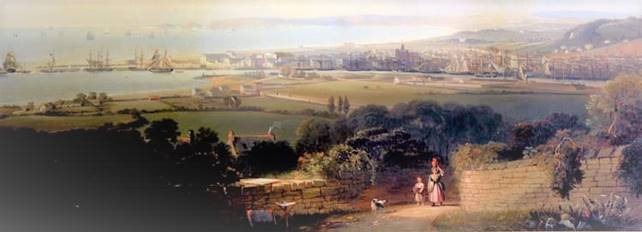Off to the National History Museum at St Fagans, ostensibly to talk about the Welsh background to Hilary Mantel’s Wolf Hall. My plan was to challenge some traditional ideas about Cromwell and the Acts of Union and to look at the family and career of his colleague in Wolsey’s household, Robert ap Rhys of Ysbyty Ifan (more on him at http://www.walesonline.co.uk/news/wales-news/welsh-history-month-ysbyty-ifan-2045988 ). But the group I was talking to was much more interested in the question of why we read historical fiction and on the relationship between novel and history.
I had to admit that I don’t read much historical fiction – it’s difficult when you keep spotting the mistakes. Mind you, I’ve never encountered anything as bad as the romantic novel set in early 19th century India (probably best not to name the author) in which a colleague of mine from the British Library found six major errors on page 1. I find historical detective fiction easier to cope with, but even there you can have problems. I had to give up on the Shardlake novels after two of them had major inaccuracies that actually affected the plot and took you off in quite the wrong direction. Should this matter in a work of fiction – well, yes, if it affects the credibility of the plot, I think it does.
But as a sixteenth-century historian I then had to say that I found Wolf Hall very good. I can’t fault Hilary Mantel on her research. I don’t see the late medieval church the way she does, though – or does she? We see it through Cromwell’s eyes, and it is part of her skill as a novelist that she persuades you into his viewpoint. In Wolf Hall, too, she is trying to build sympathy for Cromwell and his ideals, so that when he has to do much nastier things in Bring Up the Bodies we are carried along with his ultimate vision.
There’s an interesting podcast with Hilary Mantel herself talking about all this at http://www.guardian.co.uk/books/audio/2012/dec/21/hilary-mantel-wolf-hall-podcast . She does say that she wasn’t trying to rehabilitate Cromwell, but that she relished his company.
We went on to look at the church, where the texts on the walls are nearly finished. This gives another slant again on the late medieval church – the depth and richness of spiritual life for the ordinary parishioner. The liturgical reconstruction project we did there a couple of years ago was relevant to one of the key problems in writing historical fiction. Unless you are writing a very post-modernist novel, you can’t have gaps – and there are so many gaps in our historical knowledge. Often they are in the details of everyday life, the things that are so commonplace they never get recorded. We have the same problems in understanding medieval religion, and this was one of the things the Experience of Worship project was designed to help with. We know that the celebration of the Mass needed an incense boat, holy water sprinkler, jug and basin for the priest’s hand-washing, pax, etc, etc – but what exactly did you do with them, and where did you put them when you weren’t using them? And we know that the priest had helpers – but for a chantry mass in a small parish church, how many helpers, and how would they be dressed, and what would they actually be doing? All these things are part of the texture of everyday lives – so somehow the historical novelist has to fill in that cross-hatching because the historians can’t commit themselves.






Leave a Reply